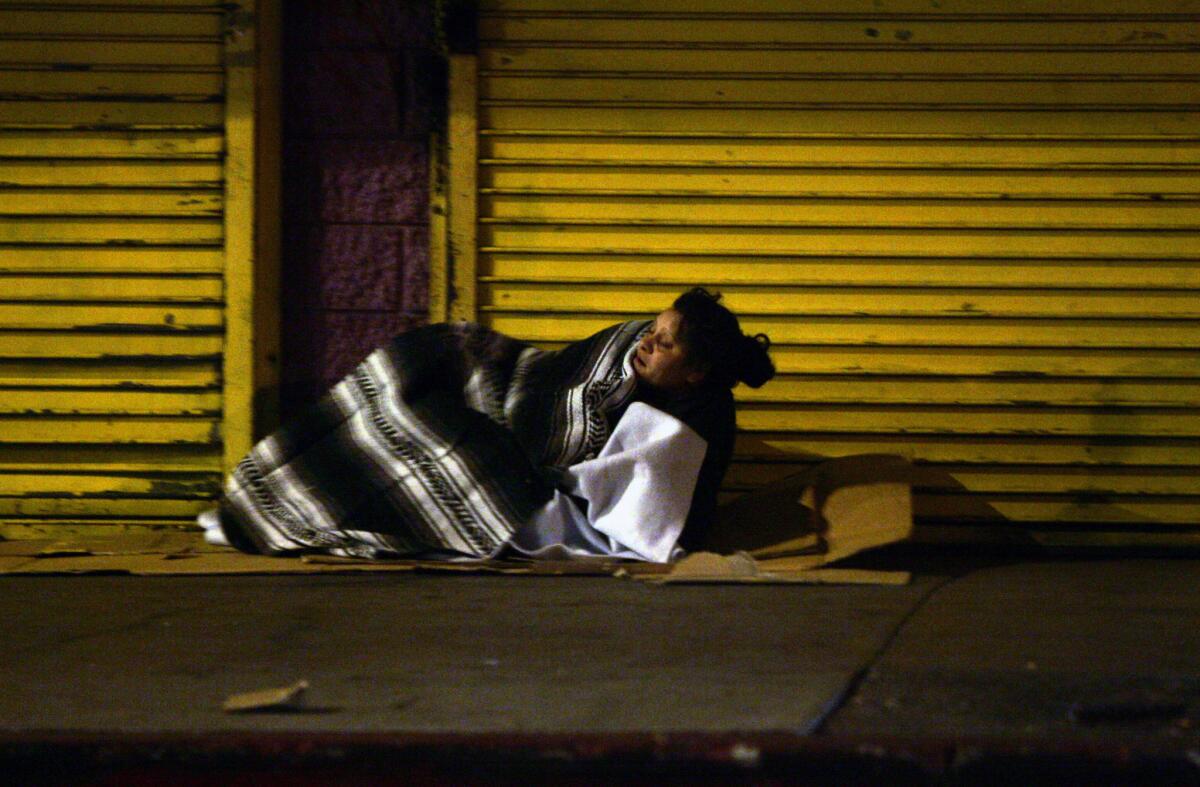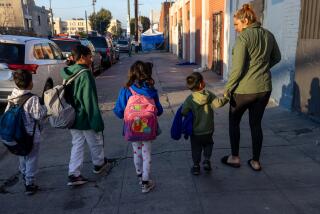A growing percentage of women on skid row are older, survey finds

A growing percentage of women living on Los Angeles’ skid row are older, and more likely to be in poor health or disabled than their younger counterparts, according to a survey released Monday.
The percentage of women on skid row ages 51 to 61 jumped from 23% in 2001 to 40% in 2013, the survey of 324 women found. Women 62 and older increased from 4% to 11% in the same period. The median age is now 50, up from 44.
The survey was conducted by the Downtown Women’s Action Coalition.
Women who have been homeless for five or more years contributed to the aging of the female population in the 50-block downtown neighborhood, the survey report said. But women who recently lost their housing because of the death of a spouse or estrangement from family are also driving up the numbers, the survey said.
“The growing number of older women living in skid row emphasizes the need for aging-related services, as well as accessible facilities and agencies,” the group’s report said.
Skid row’s total population is about 10,000, including more than 1,700 living in the streets. Officials estimate a quarter of the homeless are women.
An overwhelmingly disproportionate segment of the women are African American, 57% compared with 10% of the county’s general population in the latest census data, the report said. Most are U.S. natives, although the survey found a slight growth in immigrant women on skid row, who now comprise 15% of the total.
Over the past year, 70% of skid row’s women lived in the streets or in shelters, more than 30% were victims of domestic violence and a quarter either abused drugs or alcohol, or were in recovery from substance addiction, or both, the survey found. The others lived in renovated flophouses and hotels or apartments.
Half had been sexually assaulted in their lifetimes, including 15% in the past year, and more than 30% have performed “survival sex” in exchange for housing, cash, protection or drugs, the survey found.
Over the previous year, police arrested 44% of the women and cited 37%. The women’s center report assailed the city’s “quality of life” enforcement practices “that seek to criminalize the effects of poverty and homelessness in the name of protecting neighborhood safety.”
“Outright criminalization of poverty further intensifies the cycle of
institutionalization and disenfranchisement, and these policies seek to displace and sanitize the visible effects of poverty while doing nothing to address its root causes,” the report said.
The report recommended police stop the so-called broken windows enforcement of petty crimes by skid row women, whose arrests can disqualify them from getting into subsidized housing.
Noting that an “overwhelming majority of women” reported they did not have access to clean, safe bathrooms and showers, the women’s center also recommended the city fund 24-hour showers and bathrooms across skid row.
Other recommendations included expanding the permanent supportive housing stock for the homeless; requiring affordable and low-income units in every development, and giving women housing priority because of their heightened risk of becoming victims of street violence.
The report praised L.A. County’s Project 50, a 2007 pilot program that identified and housed those at greatest risk of dying on the street. The report said those sheltered in the program spent 150 fewer days in the hospital and 600 fewer days in jail in the first year, cutting costs to taxpayers by $550,000.
The downtown women’s coalition, composed of skid row shelters, housing and mental health service providers and community activists, was founded in 2001. It conducts surveys every three years to identify service gaps for homeless and extremely poor women in downtown Los Angeles, and to highlight effective programs, its report said.
Follow @geholland on Twitter for news about homelessness in Los Angeles.
More to Read
Sign up for Essential California
The most important California stories and recommendations in your inbox every morning.
You may occasionally receive promotional content from the Los Angeles Times.











